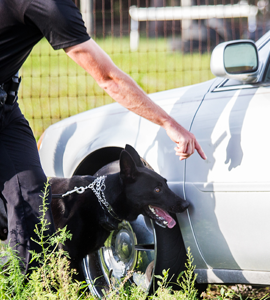Cannabis Laws Changes in Maryland Impact Drug Dog Alerts
In recent years, the landscape of cannabis laws in the United States has been rapidly evolving, with many states adopting more permissive attitudes toward its use and possession. Maryland, like several other states, has taken significant steps to decriminalize and regulate cannabis. These changes have had a profound effect on various aspects of law enforcement, including how police dogs are used to detect controlled dangerous substances (CDS) during vehicle stops. In this blog post, we will explore the recent changes in Maryland's cannabis laws and their implications for police dog alerts on vehicles suspected of carrying CDS.
Maryland's Evolving Cannabis Laws
Maryland has witnessed a transformation in its cannabis laws over the past decade. In 2013, Maryland legalized medical cannabis, allowing patients with qualifying conditions to access medical marijuana through licensed dispensaries. Subsequently, in 2014, the state decriminalized the possession of small amounts of marijuana, making it a civil offense with a fine rather than a criminal offense. These early steps laid the groundwork for more substantial changes in the following years.
The most significant shift in Maryland's cannabis policy came in 2023 when the state legalized recreational cannabis for adults aged 21 and older. This law allowed individuals to possess, use, and cultivate limited amounts of marijuana for personal use. Furthermore, it established a framework for licensing and regulating cannabis dispensaries, cultivation facilities, and processors, which has since expanded to create a robust legal cannabis industry.
Impact on Police Dog Alerts
One of the areas directly affected by Maryland's evolving cannabis laws is the use of police dogs to detect controlled dangerous substances during vehicle stops. Traditionally, trained police dogs have been invaluable tools in law enforcement for sniffing out illegal drugs, including marijuana. However, with the changing legal landscape, there have been legal challenges and questions raised about the use of police dogs in these situations.
Probable Cause and Vehicle Searches
 In many cases, a police dog's alert has been used as probable cause to search a vehicle suspected of carrying CDS. Historically, this has been an effective tactic for law enforcement in discovering hidden contraband. However, with the legalization of cannabis, courts in Maryland and other states have grappled with the question of whether a positive alert from a police dog for marijuana, a substance that is no longer illegal in certain circumstances, constitutes probable cause for a search.
In many cases, a police dog's alert has been used as probable cause to search a vehicle suspected of carrying CDS. Historically, this has been an effective tactic for law enforcement in discovering hidden contraband. However, with the legalization of cannabis, courts in Maryland and other states have grappled with the question of whether a positive alert from a police dog for marijuana, a substance that is no longer illegal in certain circumstances, constitutes probable cause for a search.
The issue becomes even more complex when considering that the smell of marijuana alone may not indicate criminal activity, as it could simply be a legal amount for personal use under Maryland's laws. Courts in Maryland have begun to consider whether a positive alert for cannabis alone should be sufficient grounds for a vehicle search, leading to changes in how police dogs are trained and utilized in the field.
Revising Police Dog Training
In response to the evolving cannabis laws, law enforcement agencies in Maryland have had to adapt their police dog training programs. Traditionally, drug-sniffing dogs were trained to detect a wide range of controlled substances, including marijuana. Now, with marijuana legalized to some extent, the training protocols for police dogs have had to be adjusted to differentiate between various substances.
Police departments in Maryland have been working to retrain their K-9 units to focus on detecting other illegal drugs and substances while minimizing false alerts for marijuana. This shift in training is not without its challenges, as dogs are highly trainable but can also be prone to habits developed during their initial training. As a result, some police departments have had to retire older dogs trained to detect marijuana and replace them with new K-9 units trained for the post-legalization landscape.
Legal Challenges and Court Decisions
The use of police dogs in vehicle searches has faced legal challenges in Maryland courts. Some defense attorneys argue that a positive alert from a police dog for marijuana should no longer be considered probable cause for a search, especially when the cannabis in question may be within legal limits. Courts have begun to consider these arguments and make decisions that reflect the changing legal landscape.
In some cases, Maryland courts have ruled that a positive alert from a police dog for marijuana is no longer sufficient grounds for a search, especially if there is no other evidence of criminal activity. These decisions highlight the need for law enforcement officers to exercise caution and discretion when relying on K-9 units during traffic stops.
In Summary
Maryland's recent changes in cannabis laws have had a significant impact on how police dog alerts for controlled dangerous substances are handled during vehicle stops. As cannabis becomes more accepted and regulated in the state, law enforcement agencies have had to adapt their practices and training protocols. Courts are also reevaluating the use of police dog alerts as probable cause for vehicle searches in light of the changing legal landscape.
The evolving cannabis laws in Maryland serve as a microcosm of the broader national trend toward cannabis decriminalization and legalization. As more states move toward cannabis reform, it is likely that other jurisdictions will face similar challenges and legal questions regarding the use of police dogs in drug detection. The balance between law enforcement's need to combat illegal drug trafficking and individuals' rights in a legalized cannabis environment remains an ongoing and evolving legal issue.
You need a skilled and experienced attorney to identify the right issues and facts to make an appropriate challenge to a search based upon a “drug dog’s” alert, especially if the dog was trained to “alert” to the smell of marijuana. Most novice attorneys will miss opportunities for this type of challenge, and/or may not articulate the issue correctly to get the right and desired outcome. The lawyers at Craig M. Kadish & Associates, L.L.C. are uniquely equipped to make such challenges as they have nearly seven decades of combined experience making complex arguments including the suppression (i.e. exclusion) of evidence seized by the police when the police search was based upon unconstitutional behavior on the part of law enforcement. If you or a loved one are in need of representation in a drug-related case, reach out today and schedule your free consultation.


